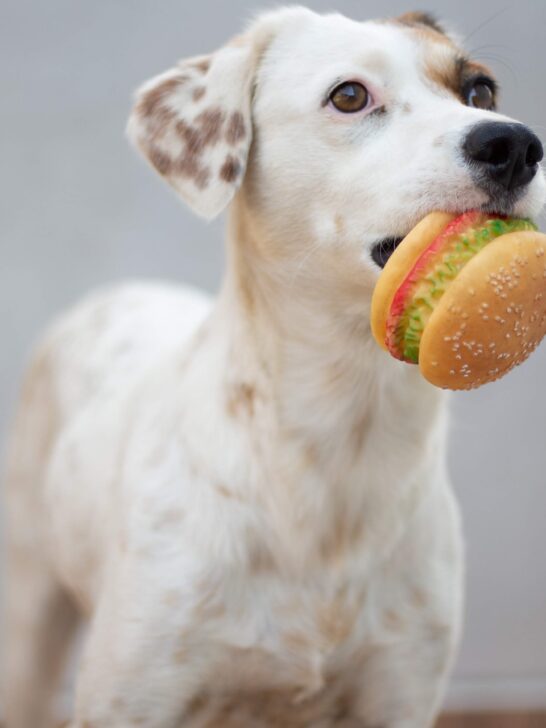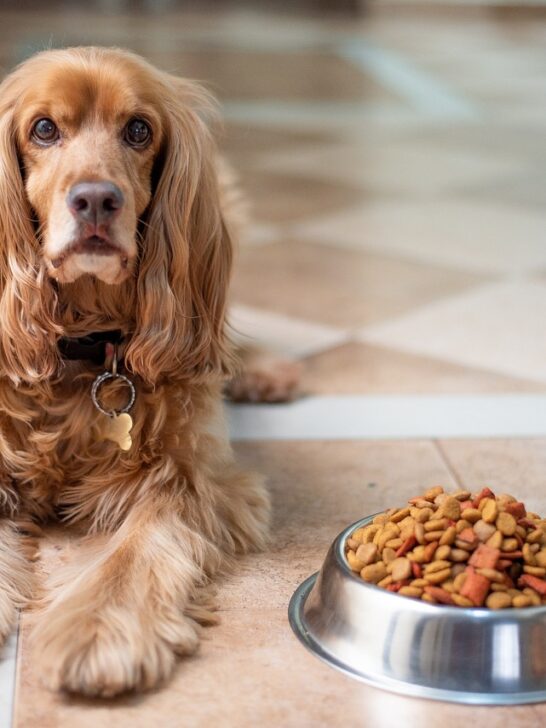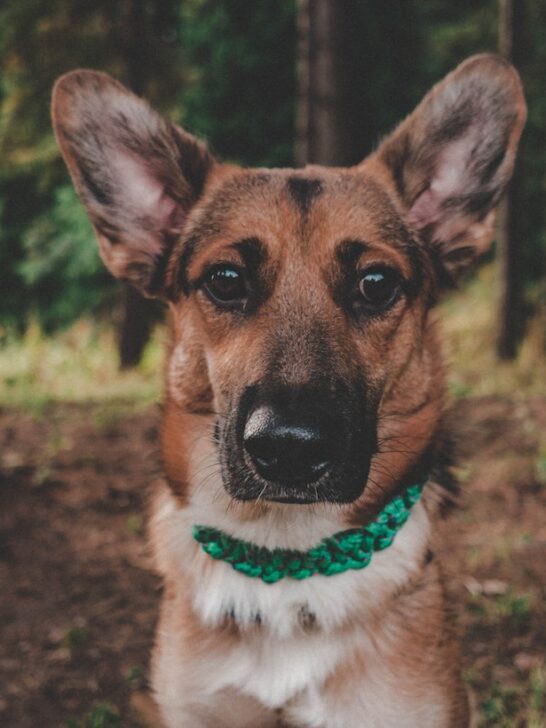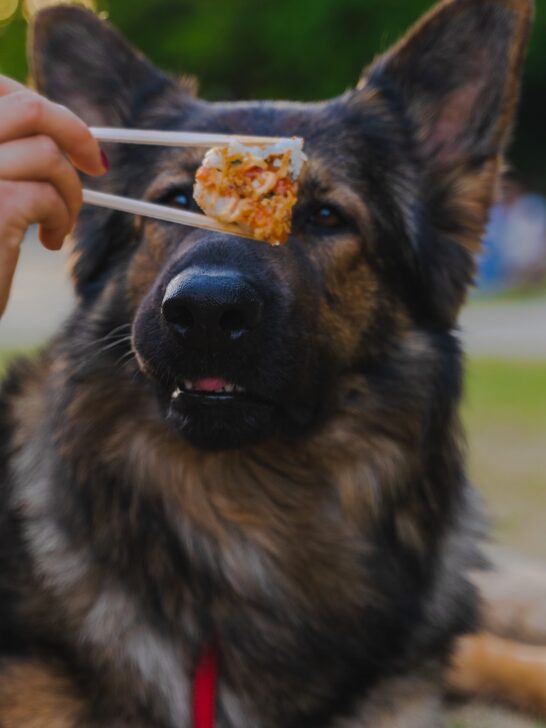Can German Shepherds Drink Milk: Why Dairy Milk and Dogs Don’t Mix
Dairy is not the first food item most people think of when they think of dogs. This is especially the case when you consider the big, brawny, powerful force that is the German Shepherd dog breed.
After all, dogs are known to be descended from ancient wild wolves. And wolves, as everyone knows, are predators that eat meat.
Other than during the time when they are rearing their young on mother’s milk, there is no dairy anywhere in sight.
But can German Shepherds drink milk? Is there ever a time when you might want to give your GSD milk or dairy products? What do canine experts say about dogs and milk?
Let’s find out!

Can German Shepherds Drink Milk: Why This Is a Bad Idea
As PetMD explains, some dogs are able to consume dairy milk without any, particularly noticeable health side effects.
This can be reassuring to know if your German Shepherd decides to drink your cereal milk or chow down on some cheese you forgot and left out on the counter!
But some dogs have a much harder time digesting dairy milk.
For these dogs, symptoms can range from simple digestive distress to an urgent condition caused pancreatitis, which we will talk about here more later on.
But What About German Shepherd Puppies? Isn’t Milk Their First Meal?
This is a great question and worth exploring further. Yes, in fact, GSD puppies do exist completely on their mom’s milk for the first several weeks of life.
As VCA Animal Hospital explains, in most cases, the weaning process will begin around the age of three to four weeks.
The mother dog knows instinctively what to do and will start pushing the puppies away when they approach her and try to nurse.
However, there is an important difference between the milk of the mom German Shepherd and the milk that people drink, which is most frequently from cows.
The mother German Shepherd dog includes the exact combination of vitamins, nutrients, and minerals the puppies need to grow up healthy.
But the puppies also have an enzyme that helps their little still-developing digestive systems break down their mom’s milk.
This enzyme is called lactase. At birth and up until weaning begins, German Shepherd puppies have a lot of lactase that helps them break down and digest their milk meals.
Once GSD puppies begin weaning, however, their bodies produce less lactase.
Over time, many German Shepherd puppies will become lactose intolerant.
This is because their bodies are no longer producing lactase because their genes don’t think they will need to break down milk as adults.

What Do German Shepherd Puppies Eat If Their Mom Can’t Feed Them?
As every experienced German Shepherd dog breeder knows, there is always something that can go wrong when you are breeding dogs.
One thing that can and sometimes does go wrong is that the mother German Shepherd is unable to produce milk to feed her puppies. This could be due to illness or infection or for other reasons.
When a mother dog can’t feed her puppies, the breeder must step in to make sure the puppies get fed with the proper mix of nutrients.
Since GSD puppies would normally drink milk, is this a time when milk can be safely fed?
The answer here again is that giving dairy milk to German Shepherd puppies is not the best choice.
In this short video, a GSD breeder explains how to make your own puppy formula using goat milk, water, an egg, and a little Caro syrup.
Another option many German Shepherd breeders use is commercial milk replacement formula or powder for puppies. Usually, this is mixed with water and offered to the puppies every few hours.
Can German Shepherds Drink Goat Milk Safely?
Even if German Shepherds shouldn’t necessarily be given dairy milk from cows, what about offering goat milk, sheep milk, soy milk, oat milk, or some of the other many alternate kinds of milk being sold today?
For example, we just mentioned goat milk as a possible meal replacement for GSD puppies.
According to Dogs Naturally Magazine, goat milk is quite a bit easier for puppies to digest than dairy milk from cows.
Goat milk has a number of properties that make it easier for German Shepherds of any age to digest it. It has less of a protein group that is linked to milk allergies in dogs.
Goat milk is also less fatty and has more essential amino acids to help German Shepherds break down the fat and nutrients quickly and without gastrointestinal symptoms or discomfort.
Can German Shepherds Drink Soy Milk Safely?
Soy is a fairly common ingredient in many commercial dog foods today. So it would seem like if German Shepherds can eat soy, such as in the form of soybeans, they could also drink soy milk.
Mercola Healthy Pets says that soy is not an ideal food source for dogs of any age.
This is because soy contains phytoestrogens, naturally occurring compounds that can impact and interact with your dog’s natural hormones.
Soy also contains compounds called phytates that can prevent your pup from fully absorbing other nutrients in their food.
So while some people do offer soy or soy milk to their German Shepherds, if it isn’t necessary for some reason, you may be better off avoiding it.
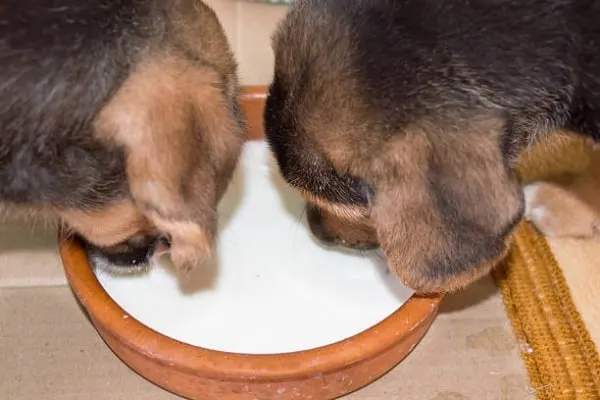
What About Other Non-Dairy Milk – Can German Shepherds Drink Those?
It is actually hard to keep track of all the new non-dairy milk alternative products that are now populating grocery store shelves.
Oat milk, hemp milk, banana milk, almond milk, coconut milk….these are just a few of the many non-dairy milk alternatives that you can choose to pour over your cereal or add to your coffee today.
Some of these are nut milk and some are plant protein milk.
There are a few things you really have to watch out for when choosing a non-dairy milk alternative made from nut or plant sources:
1. Make sure the milk does not have any xylitol!
Xylitol is a common sugar replacement that is added to many people’s foods. Even in very small quantities, it can be fatal to dogs and other pets.
Because of this danger, a good rule of thumb here is to never keep any product containing xylitol in the house.
2. Steer clear of macadamia nut milk and walnut milk.
If there is a nut in the world right now, there is probably milk made from it. But as VetWest advises, macadamia in any form is extremely toxic to dogs.
Walnut milk is also to be avoided, especially if the milk is made from black walnuts.
Nationwide Pet Insurance reports that pet insurance claims arising from walnut poisoning are one of the most common claims owners submit each year.
3. Grain-based milk may cause allergies in dogs.
German Shepherd dogs tend to be more prone to food allergies than many other dog breeds, as WebMD for Pets explains.
So choosing hemp milk or oat milk, for example, may trigger a food allergy for your GSD.
The exception here may be rice milk since rice is usually well-tolerated and can even be a part of food allergy elimination diets for dogs.
Modern Dog Magazine explains that rice products can be useful to help ease an upset stomach in dogs because it is bland and easy to digest.
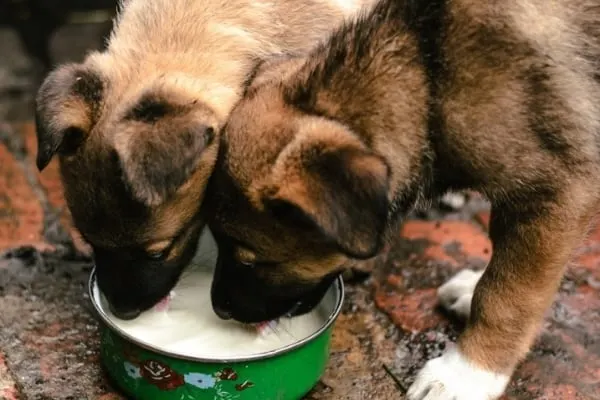
What Are the Symptoms of Milk Allergies in German Shepherd Dogs?
So now you are aware that dairy milk and most non-dairy milk alternatives are best left on the no-no list for your German Shepherd dog.
This is especially true because GSDs can be genetically prone to sensitive stomach and food allergy issues.
But what if your German Shepherd swipes your ice cream cone or slurps up your yogurt before you can stop them? How much should you worry and what symptoms should you be watching for?
Yogurt may actually be the one exception to not offering your German Shepherd milk.
As a fermented dairy product, yogurt is pre-digested and filled with good probiotics that may actually ease an upset stomach and help your dog’s immune system.
Here, talk with your dog’s veterinarian first before offering yogurt to your GSD.
Otherwise, these are the main symptoms to watch for according to the American Kennel Club (AKC):
- Loose stools or diarrhea.
- Gas.
- Bloating.
- Abdominal tenderness or pain.
- Vomiting.
These symptoms can occur on a spectrum ranging from mild to serious. The symptoms can also vary based on how much and what type of milk your GSD ate.
A slurp of dairy milk (or any milk) is unlikely to cause trouble unless the milk was made out of macadamia nuts or walnuts or your dog happens to be allergic to grains.
When in doubt, always talk with your dog’s veterinarian before offering any type of milk or milk products to your German Shepherd.

























